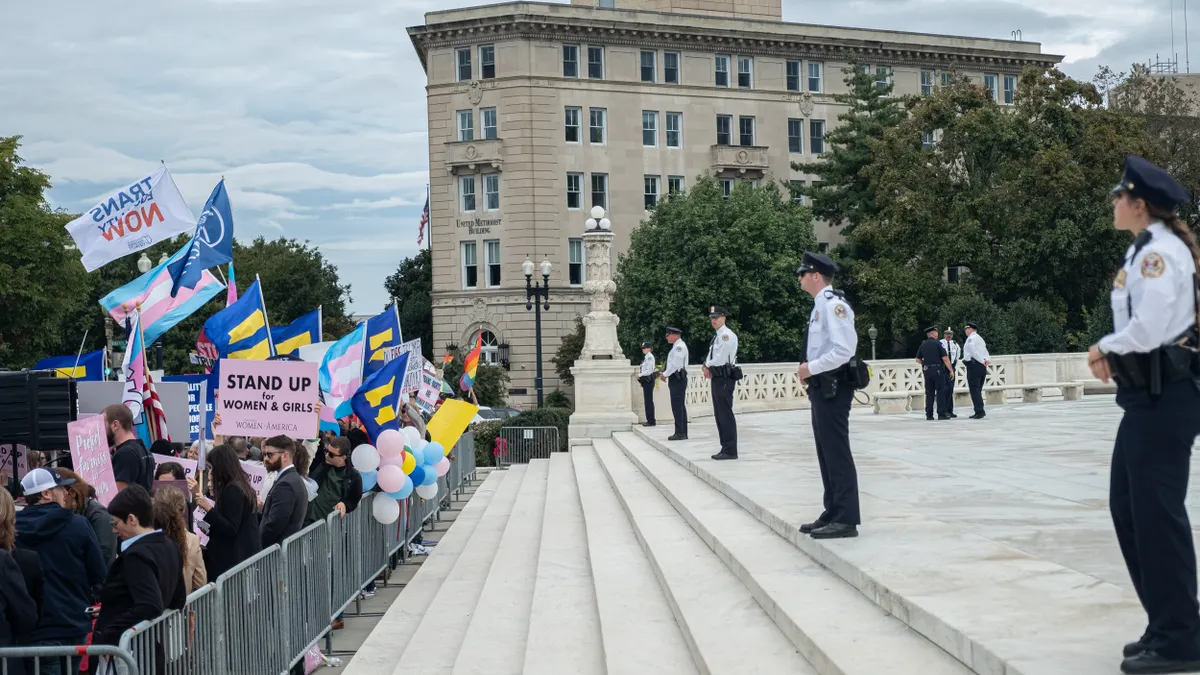Dive Brief:
- Kansas State University allegedly discriminated against an associate professor in its gender, women and sexuality studies department by, among other things, forcing him to cut his medical leave drastically short because he is transgender and transsexual, the associate professor claims in an April 28 federal lawsuit.
- Per the complaint in Weaver v. Kansas State University, the associate professor was assigned female at birth but identifies and presents as a male. Although he arranged to have six to eight weeks leave to recover from a hysterectomy, his supervisor allegedly questioned his arrangement and called him back to work after two weeks.
- He later learned that coworkers and peers who did not identify as transgender or transsexual were allegedly given more leniency for medical or similar leave requests, according to the complaint. After he filed a complaint with the university, his supervisor and a cisgender female coworker, who allegedly announced at a department meeting that she was “ashamed” of him, became increasingly hostile. He was also prohibited from speaking out of turn at meetings, removed from a committee without his consent and prevented from timely applying for tenure, the complaint alleged.
Dive Insight:
The associate professor sued Kansas State for various violations of Title VII of the Civil Rights Act of 1964 and the Kansas Act Against Discrimination, including for allegedly creating a hostile work environment on the basis of sex and for allegedly retaliating against him because he complained.
The supervisor and the coworker eventually transferred to a different department, the complaint said.
A representative for Kansas State University told HR Dive it had not received the complaint and would not comment on pending litigation.
The lawsuit comes one week after a federal district court in California refused to dismiss parts of another Title VII lawsuit based on the plaintiff’s transgender status.
In that case, the court said a former U.S. Postal Service employee’s allegations that “discrete” discriminatory actions were taken against her because she is transgender could be part of her broader hostile work environment claim under federal law.
The lawsuits remind employers that despite the EEOC’s pullback on enforcing Title VII’s protections for LGBTQ+ individuals, the statute still prohibits sex discrimination on the basis of sexual orientation and gender identity, attorneys have cautioned.
The U.S. Supreme Court clarified this protection in Bostock v. Clayton County, and unless Bostock is reversed, “employers can anticipate that charges of discrimination based on sexual orientation and gender identity will continue to be filed,” Tripp Scott attorneys Paul Lopez and Brittany Hynes pointed out in a recent op-ed to HR Dive.
Also, 24 states, the District of Columbia and three territories (Puerto Rico, the U.S. Virgin Islands and Guam) prohibit discrimination on the basis of sexual orientation and gender identity, according to the Movement Advancement Project.
However, there’s been a trend in the states to align with President Donald Trump’s executive orders defining sex as binary and immutable, Ogletree lawyers reported in an April 21 post.
Despite federal law, “Utah, West Virginia, and Wyoming lawmakers recently enacted state laws recognizing only two genders, male and female,” the attorneys wrote. The laws restrict “transgender and nonbinary individuals from using public school bathrooms and locker rooms that align with their gender identity,” the attorneys said.











